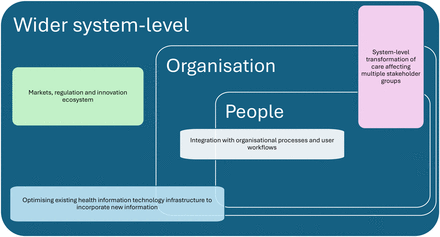Precision medicine (PM) has significant potential to contribute to the development of a truly learning health system where data-driven approaches guide care provision and treatment decisions.1 PM encompasses various inter-related concepts, including the identification and targeting of the causal mechanisms underlying diseases (which may include genomic medicine to understand aetiology), and the implementation of strategies tailored to address root causes of disease informing clinical or public health decisions customised to individual circumstances (box 1).2 PM approaches and techniques are increasingly integrated into PM platforms, often incorporating multiple interventions or technologies, such as genomics and artificial intelligence (AI) (eg, image analysis, tissue sample analyses).3–7
Definitions of terms
Artificial intelligence (AI)—‘The capacity of computers or other machines to exhibit or simulate intelligent behaviour; the field of study concerned with this. In later use also: software used to perform tasks or produce output previously thought to require human intelligence, especially by using machine learning to extrapolate from large collections of data.’27
Precision medicine—‘… the tailoring of medical treatment to the individual characteristics of each patient. It does not literally mean the creation of drugs or medical devices that are unique to a patient, but rather the ability to classify individuals into subpopulations that differ in their susceptibility to a particular disease, in the biology and/or prognosis of those diseases they may develop, or in their response to a specific treatment (page 125).’47
Precision medicine platform—A platform comprising inclusion and analysis of various data sources forming the basis for precision medicine approaches.48
Precision prevention—Public health strategies designed to tailor interventions according to specific population characteristics and risk factors.49
Genomic medicine—‘…an emerging medical discipline that involves using genomic information about an individual as part of their clinical care (eg, for diagnostic or therapeutic decision-making) and the health outcomes and policy implications of that clinical use. Already, genomic medicine is making an impact in the fields of oncology, pharmacology, rare and undiagnosed diseases, and infectious disease.’50
Implementation science—Social science-based approaches seeking to understand how new interventions are implemented and adopted.51
Formative process evaluation—A specific method under the implementation science umbrella. Social science-based approaches to studying the way interventions are developed, implemented and adopted. This information is then used to inform intervention optimisation to ensure maximum chances of sustained adoption.52
However, despite clear potential, there is still a dearth of evidence regarding the actual impact of PM on the safety, quality and efficiency of care.8 PM platforms consisting of multiple technological components are in nascent stages and currently primarily used for research purposes (eg, to help gather patient information for trials). They have yet to be integrated into health and care delivery processes. Initiatives also often focus on PM platform development in single institutions,2 with adoption, optimisation, scalability and sustainability considerations frequently being an afterthought. This is despite a significant empirical evidence base indicating that social, organisational and health system processes can make or break technology implementation. There are also significant risks associated with unintended consequences of implementing new health information technology (HIT).9–11 There are therefore missed opportunities to detect and address potentially adverse consequences, increasing the risk that PM platforms are not effectively adopted or fail to scale.
The translation of complex interventions into practice is known to be difficult.12 This poses a challenge for fast-developing technological interventions such as PM platforms. Efforts to effectively integrate agile process evaluation methods into PM platform developments are therefore crucial but remain insufficiently applied in practice.12 This work provides a starting point for how such evaluations may be conceptualised.





